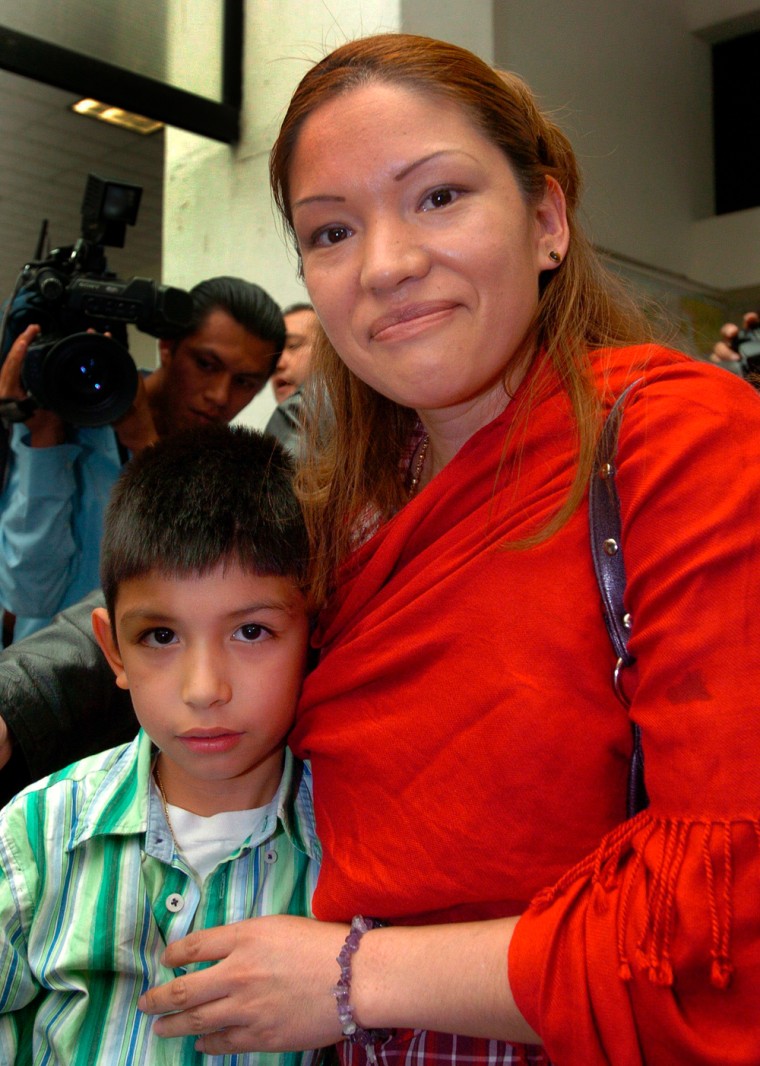An 8-year-old boy has become a star attraction at pro-immigration events since his mother took refuge in a Chicago church before she was deported to Mexico.
Now, even some inside the immigration movement are questioning whether Saul Arellano is being exploited.
“It’s almost like an act of desperation on our part. Why is it that we need to depend upon a child?” said Armando Navarro, coordinator of the National Alliance for Human Rights, an umbrella organization for Hispanic groups in Southern California.
Saul’s mother, Elvira Arellano, was in the U.S. illegally for several years before taking sanctuary at Chicago’s Adalberto United Methodist Church, where she lived with her son for a year in defiance of a deportation order.
She left the church last month to speak to other immigrants around the country and was arrested in Los Angeles by immigration authorities. They deported her to Tijuana, Mexico.
Hours after her arrest, Saul was brought to a news conference where supporters denounced her detention. He didn’t look into the cameras or even speak, instead hiding behind his godmother.
“I don’t want media,” he told his mother while visiting her a day later in Tijuana.
Boy appears at rallies, on TV
On Wednesday, advocates planned pro-immigrant demonstrations inspired by Saul’s mother in communities across the nation. The boy’s mother said Saul would be part of a vigil in Washington, D.C., or a rally in Tijuana.
Anti-illegal immigrant groups have long accused Arellano and immigration activists of exploiting Saul in their pursuit of reform. The boy has zigzagged the country for the last year, appearing at rallies, on television programs and at meetings with lawmakers.
Many Hispanic activists and immigrants have also suggested that the boy should be allowed to live a normal childhood.
“Is it right to use a child ... in political problems?” a person asked recently on https://www.hoyinternet.com/, a Spanish-language news site. “Is it right for his own mother to use him this way?”
Elvira Arellano said Saul always chose to participate in immigration activities, and doing so helped him deal with a difficult family situation.
“The movement isn’t taking advantage of him. He is the reason we are fighting,” she said in a phone interview from Mexico.
Reunited with mom
Saul was reunited with his mother Aug. 31 in Mexico City. But, she said: “Our dog, his toys, his whole life is there” in the United States. “He doesn’t know Mexico at all.”
Saul is in many ways similar to other American-born children whose parents are illegal immigrants.
About 3.1 million American children have parents who are here illegally, according to an analysis by the Urban Institute and the Pew Hispanic Center.
Such children are often forced into roles far beyond their years, such as translating for their parents, navigating the educational and health care systems they can access as U.S. citizens, and baby-sitting younger siblings while their parents work several jobs. Most carry with them a constant fear of being separated from their parents.
At rallies and news conferences, Saul is usually more interested in playing handheld video games or running around than speaking to the reporters. Since his mother was arrested in front of him last month — which she said traumatized him — he appears even more reticent.
Mom vows to keep fighting
During a brief appearance in San Jose two days after the arrest, Saul seemed bewildered when he faced a wall of reporters bearing cameras and microphones. He stood quietly, his eyes scanning the crowd, as his godmother and the pastor of the Chicago church criticized immigration laws that separate families.
Since traveling to Mexico City to join his mother, he has mostly avoided the media while his mother has met with top Mexican lawmakers and vowed to keep fighting.
The effectiveness of Saul’s presence is debatable.
“For some, even a picture of the child will pull on their heart strings,” said Tamar Jacoby, an immigration expert at the Manhattan Institute. “Others will see it as cynical, and feel the movement is using a child, and it will just enrage them further.”
Octavio Pescador, a Chicano studies professor at the University of California, Los Angeles, said that with immigration reform shelved this summer, Saul’s frequent appearances are aimed at sending a message to other illegal immigrants and their American children: “Do you think Saul will vote when he’s 18? How many kids do you think there are like him?”
